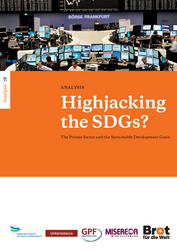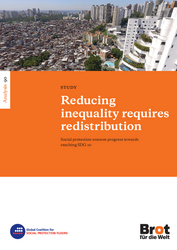
The 2030 Agenda for a Sustainable World
Ending poverty and hunger, reducing inequalities, committing to gender justice and decent work for all. By 2030, the global community wants to achieve these and other goals set out in the United Nations 2030 Agenda for Sustainable Development. There is much to do in the meantime.
From the Millennium Development Goals to the Sustainable Development Goals
In 2000, the United Nations set eight Millennium Development Goals (MDGs) to advance human development. Their focus on changes in developing countries alone was too short-sighted: A dignified life for every human being – including future generations – is only possible if the economic structures and wasteful lifestyles in the industrialised and emerging countries change fundamentally.
A Comprehensive Understanding of Sustainable Development
With the 2030 Agenda resolution at the UN General Assembly in 2015, 193 states agreed on a paradigm shift which is reflected in the title "Transforming Our World": A global social-ecological transformation is needed. This transformation is to be implemented through 17 goals which include 169 targets. They are known as “Sustainable Development Goals” (SDGs). What is new about the SDGs is their universality – they are aimed at all nations and not only the countries of the Global South. As well, the new principle “Leave no one behind” has wide-ranging consequences for the global development agenda: States must now ensure that improvements really affect all people – and in the best case help the most vulnerable first.
The 2030 Agenda thus also brings into focus social and economic inequalities with which countries of the Global South and the North struggle. In the past, economic inequality was seen not as a social problem, but as a necessary evil in the economic development of a country. One of the targets of SDG 10, “Reduced Inequalities”, for example, is to ensure that the incomes of the poorest 40 percent of the population always grow faster than those of the rest. In this way, the gap between rich and poor should be gradually narrowed.
Ultimately, the SDGs, unlike the MGDs, are not objectives in their own right, but are intertwined. Working towards one goal requires that all other goals be taken into consideration. Thus, the SDGs connect the social, economic and ecological dimensions of sustainability, and combine the fight against poverty and inequality with the protection of our natural resources. Social justice is only possible in the long term if the limitations of our planet are taken into account.
How the SDGs Can be Achieved
At current rates it would take more than three Earths for every human being to consume as many resources as a European. For this reason, things have to change in the industrialized countries, especially in how we do business and consume. We need to develop a new understanding of what constitutes prosperity and a good life.
The 2030 Agenda is not binding under international law. This makes it all the more important for affluent countries to use their financial means to take the lead in implementing the 2030 Agenda.
What Brot für die Welt Does
With our project funding, we support partner organisations worldwide that are committed to a fairer and sustainable co-existence on Earth. After decades of transformative experience, we can learn a great deal from our partners in the South. They are already designing and living sustainable alternatives. We want to make their approaches visible in Germany. The South-North exchange can help us move forward on the path to sustainable societies.
Germany as a Developing Country
So far, progress has been insufficient not only worldwide, but also in Germany. Brot für die Welt (Bread for the World) is therefore calling for consistent implementation of the 2030 Agenda in politics, business and society. In Germany, we ourselves make proposals and comment on the plans of our government. Germany’s government must set a good example internationally and ambitiously pursue the SDGs within Germany. At the same time it must support those nations which are not able to achieve these goals by their own means. We are also calling for this at the European and international levels.
In addition, we pay particular attention to ensuring that work for sustainable development is carried out coherently in various policy areas – particularly in those cases where objectives conflict. We want to prevent one hand from destroying what the other hand is creating. Conflicts arise, for example, when the politically subsidised extraction of raw materials contradicts the protection of natural resources.
Download




